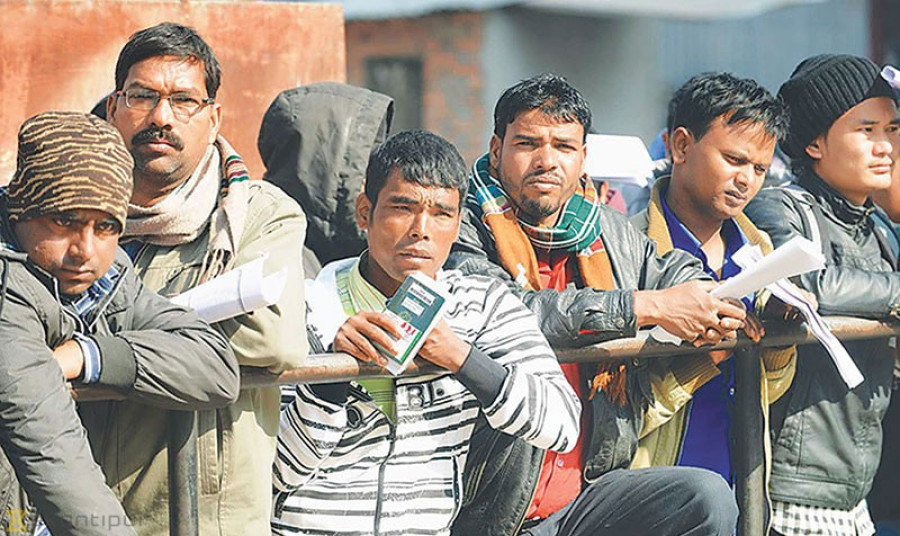Opinion
On the move
Migration, due to a lack of jobs or better pay abroad, is regarded as inevitable today
Paul I Norton
‘Could you watch your kids grow up over Skype to make sure that they have enough food to eat and money for school?’ The question came up in a discussion of what migrants experience when they go abroad—leaving families behind—to earn a better living. Over 3.5 million labour permits were issued by the government of Nepal in the decade 2007-17. Add to this the vast number of Nepalis who have opted for irregular migration or migrated to India unrecorded due to the open border between the two countries, and the picture is one of outward migration that is now unprecedented in scale and reach.
But on International Migrants Day 2018—the theme of which is ‘Migration with Dignity’—we have to ask ourselves, at what cost? Has enough attention been paid to the stress that migrants suffer while pursuing their dreams? Does the money fully compensate for the emptiness that many people feel while away from their loved ones? Migrants who opt for irregular migration often, often through a lack of information, sometimes have worse things to worry about than homesickness. Some are trapped by human traffickers or smugglers—others can find themselves in a variety of life-threatening situations.
Inevitable today
But whether migration is due to a lack of jobs at home or better pay abroad, it is now regarded as inevitable in today’s world, where nearly 260 million people are international migrants and 164 million are migrant workers. Over 40 percent of them are from Asia. In the Gulf Cooperation Council countries, most of the population are labour migrants. Migration has helped improve people’s lives in both origin and destination countries, and has offered opportunities for millions of people worldwide to lead safe and meaningful lives abroad. As such, it is increasingly seen as a high-priority policy issue by governments in the region and worldwide.
This interest has resulted in the inter-governmental negotiations leading to the adoption by 164 countries, including Nepal, of the Global Compact for Safe, Orderly and Regular Migration (GCM) in Marrakesh earlier this month. The GCM, which is a non-binding document that complements the 2030 Agenda for Sustainable Development, is the first attempt by the international community to address all aspects of international migration, while recognising national sovereignty and the need for better coordination between migrant source, transit and destination countries.
Among its objectives, the GCM calls for skills development and mutual recognition of skills; accurate and timely information for migrants and aspirant migrants about formal migration channels; better international labour market information; faster and cheaper transfer of remittances; and better protection and assistance for migrants abroad and for migrants in vulnerable circumstances. Major labour sending countries like Nepal also hope that the GCM will foster dialogue and common understanding on safety and rights of migrants with countries of transit and destination, as they also benefit from migration.
Migration can offer major benefits for migrants, their families and their countries of origin. But Nepal can also benefit by creating opportunities for returnees that encourage them to stay and invest their money and skills in the development of the national economy, rather than re-migrate. Current labour migration policies mainly focus on the recruitment and deployment of outbound workers, rather than the social and economic reintegration of returnees. A greater focus on helping returnees to secure economically viable work at home would benefit the country, as well as families and communities.
In its capacity as the current chair of the Colombo Process (CP), Nepal has an opportunity to play a leading role in fostering cooperation and dialogue across various platforms on migration issues of importance to CP member states. The CP is a regional forum of Asian labour sending countries including Afghanistan, Bangladesh, Cambodia, China, India, Indonesia, Nepal, Pakistan, Philippines, Sri Lanka, Thailand, and Vietnam. It addresses issues of regional migration governance, notably the management of overseas employment and contractual labour. The International Organisation for Migration (IOM) serves as its secretariat and provides technical support in convening CP events in the region.
Global framework
CP member countries made a significant contribution to the GCM process, and most of the group’s recommendations are reflected on the global framework adopted in Marrakesh by 164 countries on December 10. Nepal’s contribution to the process reflected IOM support to the government of Nepal in conducting a Migration Governance Indicators (MGI) Assessment and a Migration Profile to align the country’s migration management objectives with the 2030 Sustainable Development Goals.
The MGI is a tool that helps to develop a national framework that countries can use in assessing the comprehensiveness of their migration policies, while identifying gaps and areas that need to be strengthened. The Migration Profile aims to promote and support evidence-based policy making and the mainstreaming migration into policy planning processes. Both are stepping stones towards a ‘Migration with Dignity’ that makes migration a personal choice, that will guarantee the fundamental rights of Nepali migrants, and that will be a driving force for sustainable development in the coming decades.
- Norton is the Chief of Mission, International Organisation for Migration—the UN Migration Agency, Nepal.




 9.89°C Kathmandu
9.89°C Kathmandu










